Nightclubs, hook-up spots, an accepting church: Examining Portsmouth's LGBTQ+ history
PORTSMOUTH — Secret hook-up spots, gay nightclubs, local legal challenges, an accepting church and highly-regarded Seacoast eateries are a few of the topics explored in a downtown walking tour aimed at peeling back the curtain on Portsmouth’s LGBTQ+ history.
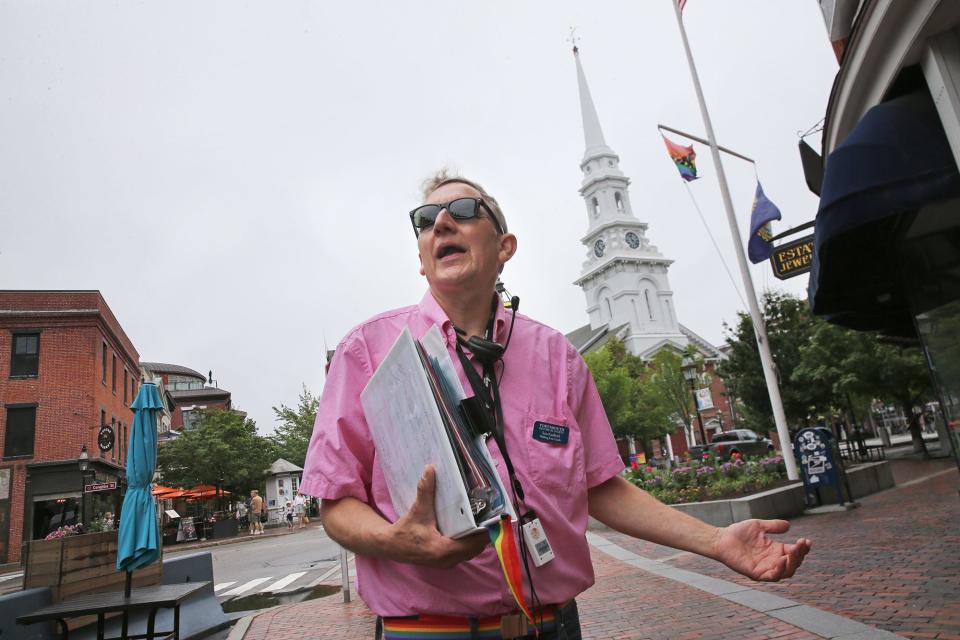
Decades ago, Portsmouth held a blue-collar reputation and was notoriously a less-than-welcoming municipality toward some, including the LGBTQ+ population, a theme expressed throughout a Portsmouth Historical Society walking tour titled “‘Gay’ Old Times: Stories of Portsmouth’s LGBTQ+ Community.”
Led by Seacoast LGBT History Project founder and “Gay Old Times” guide Tom Kaufhold, the tour zigzags through downtown streets, with Kaufhold explaining Portsmouth’s LGBTQ+ history over the years and how certain locations around the city became a refuge for gay and transgender people.
Progress, however, did not come without tragedy, pain and struggle within the local LGBTQ+ community.
Kaufhold, a Portsmouth resident, in 2015 founded the Seacoast LGBT History Project, an effort that began after he cleaned out his desk and found documentation from his and others’ attempts at getting an equal rights ordinance signed in Portsmouth in 1993. Additionally inside his desk was memorabilia from the March on Washington for Lesbian, Gay and Bi-Equal Rights and Liberation, also in 1993.
In the eight years since creating the project, Kaufhold and volunteers have compiled stories, narratives and documents from LGBTQ+ people around the region, making him a well-informed guide for the “‘Gay’ Old Times” tour.
His assessment of Portsmouth’s past pertaining to the LGBTQ+ community?
“It was a rough city,” Kaufhold said.
Here are some of the stops on the tour.
Remembering Charlie Howard, killed because he was gay
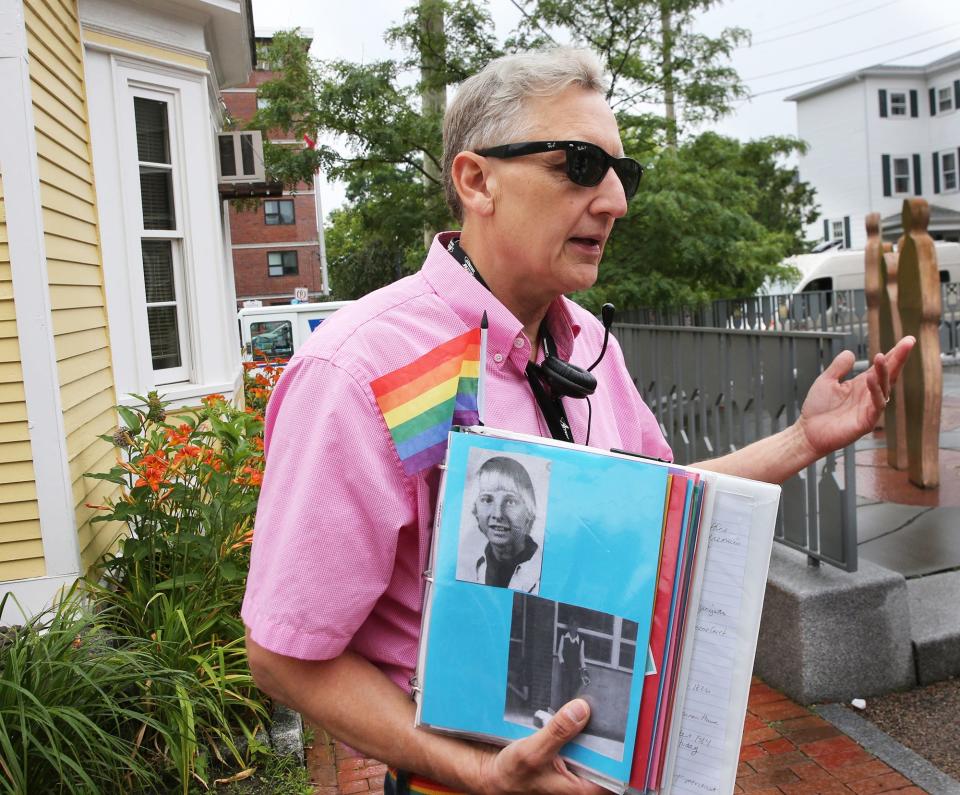
First stopping at the African Burying Ground Memorial Park, where the remains of eight people were discovered in 2003 by maintenance crews and later determined to be people of African descent, Kaufhold reflected on the city’s efforts to preserve such troubled history.
The memorial on Chestnut Street, in an area once configured as a two-way street, was completed in 2015.
“I stop here just to say that this is a perfect example of a city or town discovering something about their past and doing something about it that’s very positive,” Kaufhold said.
The memorial was used as a comparison to efforts undertaken by Seacoast LGBT History Project, which acted similarly to honor the memory of a gay young man from Portsmouth killed years ago in Bangor, Maine.
Charlie Howard, a Richards Avenue resident and graduate of Portsmouth High School, was thrown off a bridge by three teenagers in Maine in the summer of 1984, a deadly and discriminatory act committed because of the 23-year-old man’s sexuality.
More: 'He was one of a kind': Portsmouth bench honors Charlie Howard, killed because he was gay
An avid photographer who enjoyed working in greenhouses, Howard endured relentless bullying as a student in Portsmouth, including one time being dangled by his leg outside a third-floor window at Portsmouth High School. The endless torment made him opt to skip his high school graduation, then inspired him to move to Bangor, where he found a sense of community through a local church.
Heading to a post office, Howard and a friend had just left a potluck supper one night when they were approached by the teenagers, who chased Howard and caught up to him on a bridge as his asthma prevented him from further escape. Howard was assaulted and thrown by the teenagers - Daniel Ness, Shawn Mabry and James Francis Baines - off the bridge and into the Kenduskeag Stream, where he drowned.
The three teenagers pleaded guilty to their manslaughter charges, though all were released from prison before they were 21 years old.
At Orchard Grove Cemetery in Kittery, where Howard is interred, the Seacoast LGBT History Project placed a headstone marker in his memory.
The group also fundraised and purchased two memorial benches for Howard- one for the high school and the other in Commercial Alley. The latter bench is inscribed with the words “I Am What I Am,” a nod to the song from old Broadway musical “La Cage aux Folles” that Howard would sing when walking around town.
“Some of the things people would say to him were, ‘Charlie, if you didn't wear this or if you didn't carry that purse or if you toned it down a bit, you know… you wouldn't be harassed so much.’ And he would always respond to them, ‘Well, this is who I am,’” Kaufhold stated. “In the (1970s), for a kid to be doing that, he was very brave to be himself.”
The Commercial Alley bench memorializing Howard was installed in the fall of 2021.
A downtown church becomes a safe haven for the LGBTQ+ population
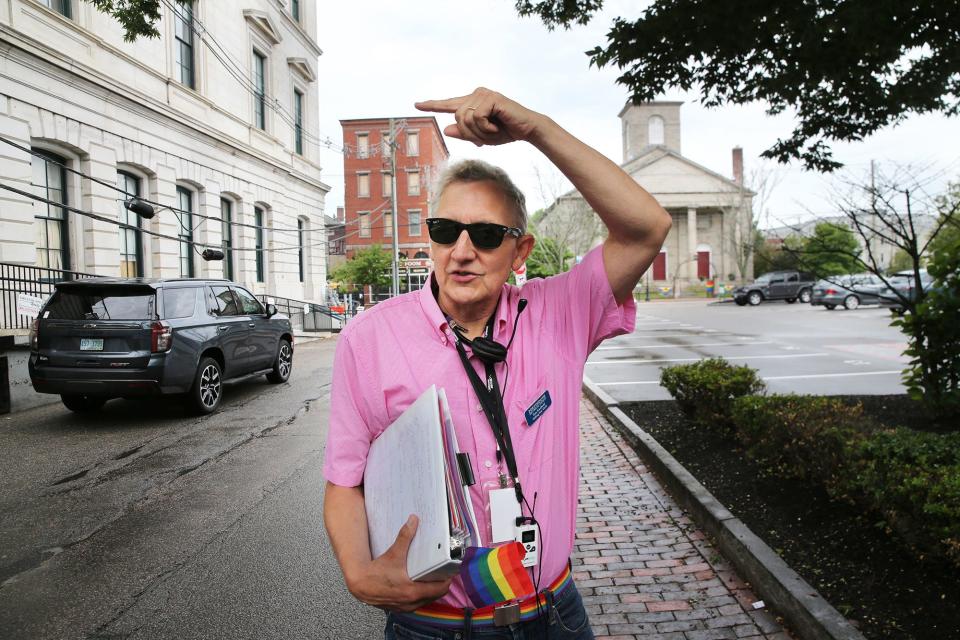
The South Church, home to the Unitarian Universalist congregation, for years has held its arms open for members of the LGBTQ+ community. Its ties to local gay history, however, are rooted in Durham at the University of New Hampshire’s flagship campus.
In April 1973, over 50 years ago, UNH students formed the school’s inaugural Gay Students Organization, which would later be barred from having social events on campus.
“The group became the target of the conservative newspaper the Manchester Union Leader, editor of the paper William Loeb, and Meldrim Thompson, governor of New Hampshire. Thomson even threatened to replace Trustee members and withhold funding from the university if the group was allowed to continue to exist on campus,” according to university library records. “After a series of controversies involving a GSO dance, a theater performance hosted by the group, and the distribution of a LGBTQ-positive publication, the University of New Hampshire decided to prevent the student group from hosting any more social functions until 'definitive legal counsel' had determined the 'legality and appropriateness of scheduling social functions of the Gay Student Organization."
The organization challenged the decision in court. In January 1975, U.S. Court of Appeals for the First Circuit Chief Judge Frank M. Coffin ruled that the school was in violation of the students’ First Amendment rights, a major victory for the Gay Students Organization and its supporters.
One of the group’s founders, Wayne April, moved to Portsmouth shortly thereafter and formed the Seacoast Area Gay Alliance, which met at South Church.
The church later lent its space to GayAA, an LGBTQ+ Alcoholics’ Anonymous program, and beginning in 1979, Seacoast Gay Men, a group that continues to meet to this day in Kittery.
“They’re probably one of the older social groups going in the U.S. that’s geared toward gay men,” said Kaufhold.
In October 1993, following the “Respect All Youth Conference” at UNH, Seacoast Outright held its first support meeting in the Karnan House behind South Church.
A nod to the Blue Strawbery and Stonewall Kitchen
While some areas of town were not as welcoming in the past, a gay cook arrived in Portsmouth years ago and helped shake up the landscape.
James “Buddy” Haller, the owner and chef behind the former Blue Strawbery, opened up the Ceres Street restaurant in 1970, operating it until 1986 and helping transform the rough area to one people would no longer fear.
More: At the Athenaeum: Portsmouth's Blue Strawbery chef James Haller follows his bliss at 86
“Then here comes James Haller in the middle of this saying, ‘I’m going to do this fancy restaurant.’ And he was successful,” Kaufhold added.
Haller, along with Gene Brown and Mark John Burke, founded the restaurant in November 1970 with a $4,500 loan from family and friends. The establishment’s popularity quickly took off as it became known for offering new dishes each night.
The Blue Strawbery building is now occupied by the Black Trumpet, owned by chef Evan Mallett.
“He really is credited with starting the restaurant renaissance in Portsmouth,” Kaufold remarked.
The tour pays homage to another famed, LGBTQ-led food endeavor that began in the city.
Years ago, business and life partners Jonathan King and Jim Stott, the co-founders of Stonewall Kitchen, first met at a Portsmouth coffee shop while both working as Seacoast-area waiters. Using food from King’s backyard garden, the two created a number of homemade jams, jellies and marmalades, products so tasty that their friends encouraged them to package their items and try selling them at farmers' markets.
In 1991, King and Stott set up shop at the Portsmouth Farmer’s Market, which used to be held in the Parrott Avenue parking lot, quickly becoming a hit with market patrons with spreads such as their original wild Maine blueberry jam.
The couple then decided to take their operation to new heights.
“Setting up shop in Jim’s family summer cottage, they spent endless hours cooking, hand-writing labels, taking photos and selling products,” an online history of the business reads. “Often it became a full family affair: nephews and nieces filled jars one-by-one, Jim’s 90-year-old grandmother, Pearl, helped glue burlap onto jar lids and Jonathan’s mother worked as a store clerk.”
According to the company, Stonewall Kitchen has gone from producing several dozen jars for the city farmer’s market to making 75,000 jars per day.
The vastly successful company’s name parallels a watershed moment in the gay liberation movement: the Stonewall riots.
In June 1969, police in New York City raided the Stonewall Inn, an LGBTQ+ bar in Greenwich Village, sparking clashes between protesters and the cops for several days.
Kaufhold, however, shared that Stott once explained he and King’s company was not named in homage to the monumental riots.
“When they decided to come up with a name for their products or the company, at the time they were renting an apartment in North Hampton, which had a stone wall outside of it,” he said.
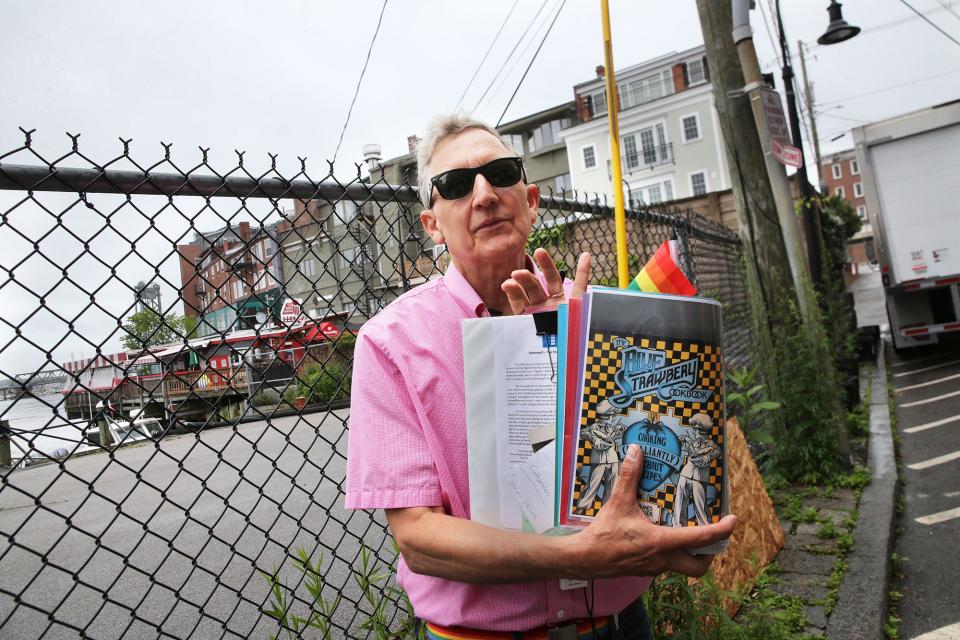
Members-only LGBTQ+ clubs and hook-up spots around Portsmouth
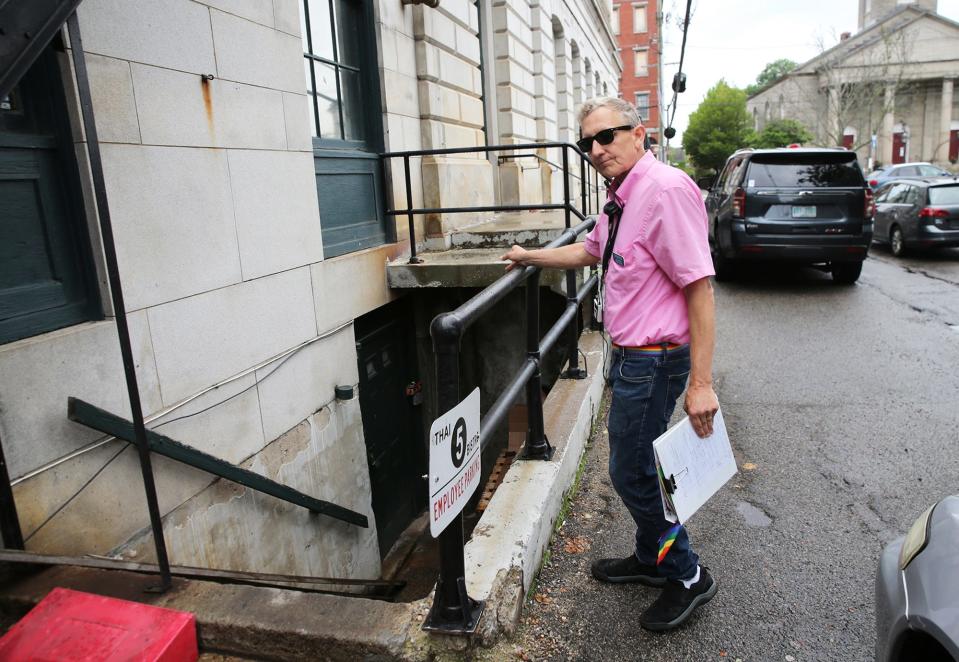
The 163-year-old, three-story Custom House in the heart of downtown today holds several businesses, including Book & Bar, 5 Thai Bistro, Great Island Realty and Kimberly Sarah Photography, a dog portraiture company.
More: Custom House in Portsmouth sold for $4.9 million: 'Historically sensitive rehab' in works
Years ago, however, the Pleasant Street structure was home to a buzzing women’s nightclub with a backdoor entrance.
Opened by Mercy Chick and Randon Eddy in 1980, Iris was a members-only, downstairs women’s bar with pool tables, a lively dance floor and disco ball.
Seventy-five women arrived for Iris’ first night in business: New Year’s Eve, 1980, according to Kaufhold. When the club opened, he added, the business didn’t even have a liquor license yet.
“They knew they had a good thing going,” he said.
The club had two egresses, though one used in back that dipped down below-ground was more frequently used by members who preferred to be more hidden from view. The entrance is adjacent to the modern-day Black Heritage Trail of New Hampshire marker dedicated to Pomp and Candace Spring, next to a bank parking lot.
The lot, Kaufhold noted, formerly held public restrooms which were used by gay men to secretly hook up, otherwise known as tea rooms.
The bathrooms were not the only city site used as a meeting place by gay men for such encounters. The list of other intimate locations includes the bushes at Prescott Park, Peirce Island and the bathrooms at the former J.J. Newberry’s downtown department store, Kaufhold noted.
“The thing to keep in mind was that at the time, what did you have? You had the shipyard and all those men, and you had Pease with all those men. They were hooking up wherever they could,” he said.
Iris, which closed in 1988, was later replaced by Katz, a women’s club that moved to Hampton. The business later moved back to Portsmouth on the Route 1 Bypass, where it was later renamed Desert Hearts and then Club One North. Another city gay club, Members, operated on Route 1 behind a modern-day U-Haul rental shop.
Thought to be the very first gay nightclub in Portsmouth, however, was a business that operated in the floors above where the Press Room presently stands on Daniel Street.
According to Kaufhold, in 1938, a Bridge Street business obtained a liquor license and operated mainly as the Greek Acropolis Club, among numerous names. In 1956, the club moved a few blocks away to Daniel Street into a former furniture store.
“Their membership was going down, so they decided to let the gays in,” Kaufhold said.
The Seacoast LGBT History Project has documentation from the club claiming it held the first drag ball in Portsmouth’s history on New Year’s Eve, 1972.
The ticketed "'Gay' Old Times" walking tour runs on the second Sunday of each month through the Portsmouth Historical Society.
This article originally appeared on Portsmouth Herald: Tour offers insights into Portsmouth NH's vibrant LGBTQ+ history

